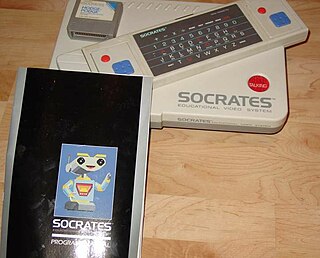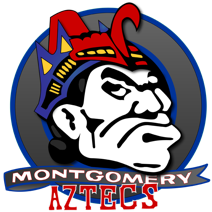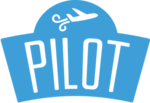Mathematics, Engineering, Science Achievement (MESA) is an academic preparation program for pre-college, community college and university-level students. Established in 1970 in California, the program provides academic support to students from educationally disadvantaged backgrounds throughout the education pathway so they will excel in math and science and ultimately attain four-year degrees in science, technology, engineering or math (STEM) fields. The program has successfully been replicated in over a dozen other states.
Educational technology is the combined use of computer hardware, software, and educational theory and practice to facilitate learning. When referred to with its abbreviation, "EdTech", it often refers to the industry of companies that create educational technology. In EdTech Inc.: Selling, Automating and Globalizing Higher Education in the Digital Age, Tanner Mirrlees and Shahid Alvi (2019) argue "EdTech is no exception to industry ownership and market rules" and "define the EdTech industries as all the privately owned companies currently involved in the financing, production and distribution of commercial hardware, software, cultural goods, services and platforms for the educational market with the goal of turning a profit. Many of these companies are US-based and rapidly expanding into educational markets across North America, and increasingly growing all over the world."

A hackathon is an event where people engage in rapid and collaborative engineering over a relatively short period of time such as 24 or 48 hours. They are often run using agile software development practices, such as sprint-like design wherein computer programmers and others involved in software development, including graphic designers, interface designers, product managers, project managers, domain experts, and others collaborate intensively on engineering projects, such as software engineering.

Daphne Koller is an Israeli-American computer scientist. She was a professor in the department of computer science at Stanford University and a MacArthur Foundation fellowship recipient. She is one of the founders of Coursera, an online education platform. Her general research area is artificial intelligence and its applications in the biomedical sciences. Koller was featured in a 2004 article by MIT Technology Review titled "10 Emerging Technologies That Will Change Your World" concerning the topic of Bayesian machine learning.

Science, technology, engineering, and mathematics (STEM) is an umbrella term used to group together the distinct but related technical disciplines of science, technology, engineering, and mathematics. The term is typically used in the context of education policy or curriculum choices in schools. It has implications for workforce development, national security concerns, and immigration policy, with regard to admitting foreign students and tech workers.
Middleton High School is a public high school in Tampa, Florida named in honor of George S. Middleton, an African American mail carrier, businessman and civic leader who moved to Tampa from South Carolina in the late 19th century. Middleton was established for black students in 1934 during the segregation era. The current facility opened in 2002 on North 22nd Street in East Tampa.
The Southeast Asian Service Leadership Network, SEALNet, is a 501(c)(3) non-profit organization based in the San Francisco Bay Area, United States, dedicated to service leadership and working with Southeast Asian communities around the world. SEALNet was founded in 2004 by undergraduate students at Stanford University in collaboration with members from the Southeast Asian Leadership Initiative (SALI). In 2006, SEALNet and SALI merged under the SEALNet name.

An educational video game is a video game that provides learning or training value to the player. Edutainment describes an intentional merger of video games and educational software into a single product. In the narrower sense used here, the term describes educational software which is primarily about entertainment, but tends to educate as well and sells itself partly under the educational umbrella. Normally software of this kind is not structured towards school curricula and does not involve educational advisors.

Clarksburg High School is a public high school located at 22500 Wims Road in Clarksburg, Maryland, United States. It is part of the Montgomery County Public Schools system, Maryland's largest public school system. Its students mainly come from Rocky Hill Middle School and Hallie Wells Middle School.

Montgomery High School (MOH) is a four-year public high school in San Diego, California, United States. It opened in 1970 in the Otay Mesa neighborhood. The school serves more than 2,500 students. It is named after pioneer aviator John Joseph Montgomery, who made the first manned glider flight in U.S. history from a hill where the school is located.
A chief learning officer (CLO) is the highest-ranking corporate officer in charge of learning management. CLOs may be experts in corporate or personal training, with degrees in education, instructional design, business or similar fields.
The SeaPerch is an educational tool and kit that allows elementary, middle, and high-school students to construct a simple, remotely operated underwater vehicle, or Remotely Operated Vehicle (ROV), from polyvinyl chloride (PVC) pipe and other readily made materials. The SeaPerch program is a curriculum designed program that teaches students basic skills in ship and submarine design and encourages students to explore naval architecture and marine and ocean engineering concepts. It was inspired by the 1997 book,Build Your Own Underwater Robot and other Wet Projects, by Harry Bohm and Vickie Jensen. The Massachusetts Institute of Technology Sea Grant (MITSG) College Program created the SeaPerch initiative in 2003, and it is sponsored by the Office of Naval Research, as part of the National Naval Responsibility for Naval Engineering (NNRNE) to find the next generation of Naval Architects, Marine Engineers, Naval Engineers, and Ocean Engineers.

University City High School was a public secondary school in the University City section of West Philadelphia, Pennsylvania, United States, which operated from 1972 to 2013.

Aaltoes, also known as Aalto Entrepreneurship Society, is a non-profit organization run by students, based in Helsinki, Finland. Founded in 2009, Aaltoes has helped the rapid emergence of a startup culture in Finland in 2008-2011.
Robert Frederick Tinker was an American physicist, science educator, and education technology innovator, who pioneered constructivist approaches to education, particularly novel uses of educational technology in science. He is known for leading the initiation of probeware for education. He was also the creator, with Monica Bradsher of the National Geographic Society, of the first global kids online science network, the National Geographic Kids Network,. He created one of the first virtual high schools, working with Dr. Shelley Berman, then Principal of Hudson Schools in Massachusetts. He served as a co-founder and president of the Concord Consortium from 1994 to 2009.

Dream it. Code it. Win it. is a 501(c)(3) non-profit organization launched by Cristina Dolan, the MIT Club of New York, the MIT Enterprise Forum of New York City, and TradingScreen to celebrate and reward computer science education amongst high school students, college students, and young women. Dream it. Code it. Win it. held its inaugural "create-a-thon" at the Cooper Union Great Hall in New York City on the evening of April 30, 2014, and awarded students more than $70,000. The awards ceremony was preceded by a panel discussion, which included: Joi Ito from the MIT Media Lab, Mike Perlis the CEO of Forbes, Jeanne Sullivan the co-founder of StarVest Partners, Philippe Buhannic the CEO of TradingScreen, Erik Nordlander an Engineering Partner at Google Ventures, Teresa A. Dahlberg the Dean at Cooper Union, and Alex Diaz the Head of Product Development at Yahoo!.
William Zhou is a Canadian internet entrepreneur. In 2012, Zhou co-founded Chalk.com, a K-12 education software company. He has appeared as a frequent commentator on major networks, a speaker at Bloomberg Next Big Thing Conference, and was named in Forbes 30 Under 30.

HackMIT is an annual student-run hackathon held in the fall at the Massachusetts Institute of Technology.
Shaundra Bryant Daily is an American professor and author known for her work in the field of human-centered computing and broadening participation in STEM. She is a professor in the Department of Electrical and Computer Engineering and Computer Science at Duke University.

Yaroslava Yuriyivna Boyko - is a Ukrainian public figure, from 2015-2019 coordinator of the Kyiv Smart City initiative, creative director of L'Officiel Ukraine.











